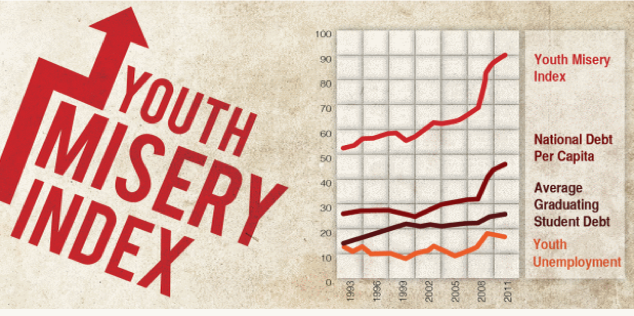
Teens and twenty-somethings born in the 1990s and late 1980s, known as “millennials” by marketers and “self-obsessed douchebags in skinny jeans” by the rest of us, would rather prod around on smartphones and laptops than drive across town to see friends.
Millennials are putting off learner’s permits and licenses, waiting until it’s absolutely necessary or abandoning driving entirely, choosing to bum rides or take public transportation.
From Edmunds:
“In 2008 the Federal Highway Administration reported that over the previous 10 years the portion of American 16-year-olds holding driver licenses had dropped from 43.8 percent in 1998 to just 29.8 percent in 2006. That’s a statistic almost unfathomable to earlier generations of drivers who would have chewed through granite to get licensed and on the road.”
It’s Farmville over freedom, a baffling choice until you consider why.
In 1997, when I received my first driving permit, gasoline was 90 cents per gallon. Ten dollars would fill the tank of my Nissan and at 25mpg it sometimes lasted weeks — that’s damn near free. Internet connections crawled at 33.6kbps and the only social networking we had was the sparsely populated AOL Buddy List.
Fast Tube by Casper
For most of us, phones were primarily appliances plugged into the wall. A few of my privileged peers had cellular service but they were only capable of making and receiving voice calls. Even then, coverage areas were quite limited.

If you wanted to interact with girls outside of school, you had to get in the car and see them in person. If you wanted to take one out, you needed money, so you got an after-school job serving corn dogs at the mall — a job that you also drove to. The automobile wasn’t just a method of getting around, it was the key to sexual and emotional development, a path to maturity, and a platform for learning how to make responsible adult decisions.
Unfortunately, as young college graduates struggle to find work, they find themselves working in service jobs normally occupied by high school students, suffocating under the burden of heavy education debt and high unemployment. This displaces teens from entry-level occupations and makes vehicle ownership a luxury.

[Source: Young Americas Foundation]
While some millennials have happily abandoned the automobile in favor of Facebook, others are simply unable to afford the privilege of driving.
I had the advantage of growing up in a period of widespread prosperity, when jobs grew from trees and gasoline was cheaper than water. Motoring wasn’t just a means to an end, it was an end in itself, an interaction between man and machine that was and still is engagingly satisfying.
Admittedly, smartphones and computers are more effective at connecting large quantities of people and allowing them to share ideas and experiences, but without personal transportation, there’s fewer experiences to create and share.
For the US auto industry, an entire generation of customers is lost as a significant part of postwar American life quietly fades. A segment of America’s youth may never appreciate the sonorous pleasure of a V8 or the assertive control of a sports car.
There is, however, a small upside.
While I may be inclined to point fingers at Gen Y and dismiss them as soulless agoraphobic slackers, their disdain for driving benefits motoring enthusiasts by reducing traffic congestion, reducing accident fatalities, and reducing oil consumption.
So, kids, feel free to stay home posting status updates. That’s more gasoline and asphalt for me.
Just stay off my lawn.